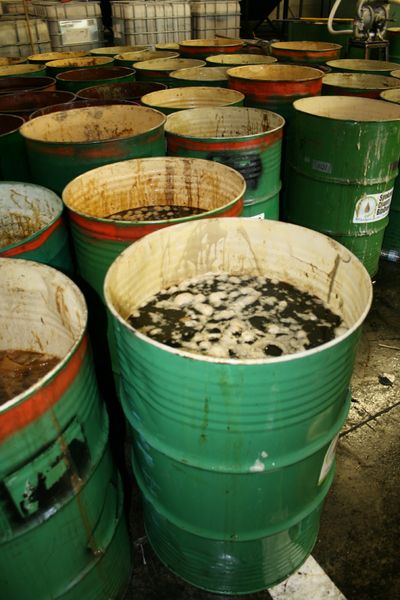Vegetable oil may help revolutionize transportation

Pollution concerns, desires to be less dependent on foreign oil, and unpredictable gas prices have made alternative forms of transportation more and more popular.
One of those concepts is converting vegetable oil – what makes our French fries taste good – into fuel for diesel vehicles.
“It’s absolutely the most intelligent way to go these days to become green-conscious, of recycling waste into something to use,” said Jeromy Fouts, general manager of a local chain of Denny’s restaurants. “In this case, it becomes a fuel source for vehicles.”
The restaurants provide used vegetable oil to Spokane County Biodiesel, which does business as Northwest BioFuels, a locally owned and operated waste vegetable oil refining plant.
This oil may seem like a strange source of fuel, not unlike the ‘Mr. Fusion’ motor in “Back to the Future,” which was powered by household garbage.
Doug Bartlett, president of Northwest BioFuels, and his investors were initially surprised how well grease worked.
After getting upset about fuel prices, he heard about vegetable oil and converted his wife’s 2003 diesel-powered Volkswagen Jetta, which he dubbed a “grease car.”
“It was just absolutely amazing to me that a car could run on something other than petroleum because that’s what we’ve always been taught,” he said.
Interestingly, petroleum was not the first fuel used in a diesel vehicle.
“The first diesel was run on peanut oil,” said Mike Waller, owner of Classic Auto Parts in Hayden, Idaho, and one of Northwest BioFuels’ major investors, and owner of a converted Dodge 96 Cummins truck. “Diesel can run on anything that will ignite under combustion.”
Waller said the use of vegetable oil to run a vehicle actually is a return to less technology.
“We’re back to the diesel engine the way it was supposed to be,” he said.
Waller says diesel engines get excellent mileage compared to their gas-fueled counterparts. An average sedan can get upwards of 50 mpg in favorable driving conditions, plus fewer emissions.
How does this process work?
It starts with the restaurants, which typically dump old grease into barrels, usually provided by companies such as Northwest BioFuels.
These companies haul away the grease for free and begin processing it into a cleaner product, which usually consists of filtering out remnants of food and removing the water.
Once collected and refined, this cleaned-up oil can power diesel vehicles with vegetable-oil friendly fuel systems added to their engine. This technology, which generally costs $2,500-$5,000, includes a heated fuel pump, temperature gauges, and a switch that toggles between diesel and vegetable fuel sources.
This fuel system heats up and thins out the vegetable oil so that it can combust and power the engine.
Grease car owner Art Collins, who added this fuel system to his vehicle in 2006, said his decision has had its challenges: he can’t currently find reasonably-priced vegetable oil and buying it in the grocery store is cost-prohibitive.
He recently went through a 200-gallon supply, which he purchased for $1.95 a gallon when he put the system in his car. He’s been waiting for Northwest BioFuels to begin selling cleaned-up oil locally, which is hoped to happen by the end of September, according to Bartlett.
Right now, Northwest BioFuels wholesales its refined vegetable oil to national biodiesel companies which mix it with petroleum-based diesel.
Grease car enthusiasts also must learn new ways of driving.
Collins carries replacement fuel in the trunk, since there’s no infrastructure locally to replace his fuel.
The car’s pre-heat fuel system uses diesel power to heat and thin out the grease, so it can be injected into the engine. This process takes about 10 minutes, but once it’s done, there is no noticeable sound or change in performance once you toggle between the diesel and vegetable oil.
He also has to be mindful of purging the grease from his engine if he’ll be parking for longer than 30 minutes, so that he’s able to start the process all over again when he returns.
Tyson Keever, general manager of Portland-based SeQuential Biofuels, one of the companies that buys Northwest BioFuels’ refined vegetable oil wholesale, thinks biofuel is a great solution, but with some disclaimers.
“Is it profitable? Will a stream of cooking oil create jobs and help support the local economy and local businesses?” asks Keever. “Yes, it’s viable in this aspect. Will it be the Holy Grail solution to our energy needs? No. There’s just not enough cooking oil out there for this.”
Vegetable fuel can help grow the local economy, it provides energy security and independence, and cleaner tailpipe emissions. But there is a limited quantity.
The vegetable oil industry estimates we produce one gallon of cooking oil per person per year.
In a population of 500,000, that’s how many gallons of cooking oil would be available per year, at least locally. In Oregon, 720 million gallons of diesel are used on the road per year. With a population of 3.5 million, recycled vegetable oil would only augment a half of a percent of the total amount of diesel used in Oregon.
“We have to use less fuel, first and foremost,” concludes Keever.
Regionally, this oil used to be consolidated in Tacoma, Wash., and then shipped to Asia for soaps, cosmetics or ingredients in cattle feed.
However, Keever believes recycling this oil into fuel alone or to be mixed with diesel is a better option.
“Before, we recycled this commodity as a lower-valued resource, with restaurants actually paying to get rid of their cooking oil, like they would garbage,” he said. “Today, its value has increased providing more opportunities to not only grow a local economy but to find ways to use it that aids those wanting to reduce pollution in our environment.”
For more information visit:
Northwest BioFuels, www.northwestbiofuels.net
SeQuential Biodiesel, www.sqbiofuels.com
Greasecar Vegetable Fuel Systems, www.greasecar.com
Sustainable Biodiesel Alliance, www.sustainablebiodieselalliance.com
National Biodiesel Board, www.biodiesel.org
National Renewable Energy Laboratory Biofuel Information, www.nrel.gov/biomass/pdfs/39436.pdf